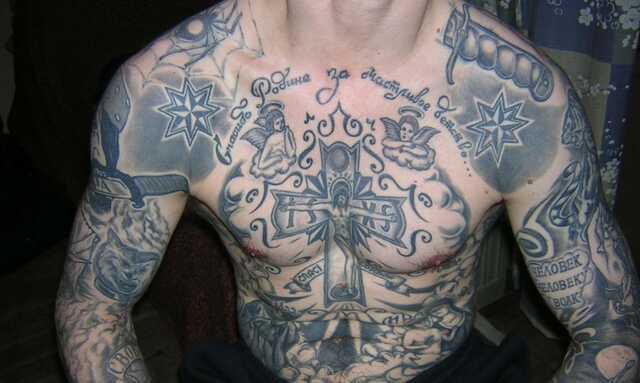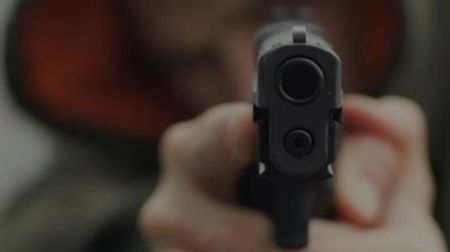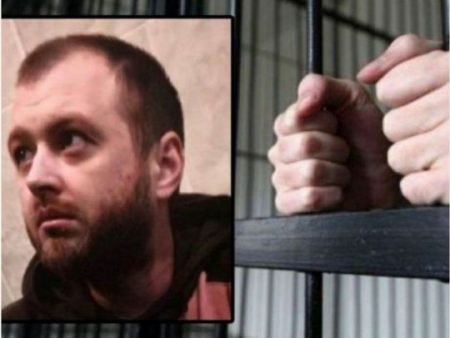In the area of the station girls hired Caucasians and paid good money, used prostitutes not for their intended purpose, namely: the old “Corolla” bypass several addresses in Khabarovsk, near which stood for several hours and looked for something.
The trips lasted about a week, during which the prostitutes were never released and were always taken along, even to the apartment where the Caucasians lived. When the right time came, the girls managed to escape and informed an acquaintance of a local police officer. After paying a small amount of money, we visited all the addresses we had been given. These were places often visited by the Neighbor, including the home address of the criminal authority at Ladozhskaya 27, and the address of the urban shooter, which at that time was a former bus control room at the railway station.
They decided that the best place to set up an ambush was in the apartment that the Caucasians rented in a building near school №38. It was evident that the 'guest workers' were planning an attempt on Merkumyantsev’s life and they needed the prostitutes as a cover in case the surveillance was discovered by the Neighbor’s guards. At the specified address, there was only one Caucasian man in his forties, carrying a briefcase filled with U.S. dollars and several new portable radios. After carefully searching the apartment, we found several Russian passports taped inside the dining table, and in one of the rooms, we found rags with gun oil. No weapons were found in the apartment. In the parking lot next to the house where the killers lived, they found an old Corolla that had been cleverly purchased: the registered owner of the Corolla was listed as deceased.
We waited in ambush for 24 hours, but the killers did not arrive. We had to release the Caucasian man who was in the apartment, as he had nothing to show us and had already started to ask for a lawyer. This is how we prevented the murder of the 'responsible' from the OPS 'Obschak' for the city of Khabarovsk.
As I mentioned, in the 1990s there were about ten thieves in Komsomolsk-on-Amur. I say 'about' because Jem, while approaching the new 'tramps', removed the crown from some of the old ones for various offenses.
Vasin Evgeny Petrovich (Djem), born on November 10, 1951, was essentially a man who was crowned in a Tobolsk indoor prison in order to organize a thieves’ movement in the Far East. Vasin was tried for hooliganism, which means 'cormorant' in French. In the 'juvenile facility', he wore a red armband, meaning he cooperated with the administration. While serving his sentence, he applied for parole and worked in the penal zone as an unconvoy (prisoner loyal to the administration), making barbed wire for fencing zones. In the 1980s, Vasin organized the 'Union of True Prisoners' and spoke out against the thieves’ movement, which, as Crab used to say, 'you can’t put on any dick at all anymore'. While all these details contradict the thieves’ code and can easily lead to a prisoner's murder, Vasin was still crowned based on political considerations – to organize the thieves’ movement in the Far East.
Kiselev, after finding out the home address of the regional criminal investigator, rang the policeman’s doorbell the next evening. Tsigelnikov, who obviously knew Kiselev, opened the door and was immediately hit on the head with a newspaper, which, as the joke goes, contained an iron pipe, after which Kiselev calmly left the entrance of the apartment building.
It was Vasin Evgeny who started the coronation of all the mentioned individuals, so that his decisions were legal and approved by the group of thieves. I won’t go into detail about thieves’ traditions and ways, as it was already extensively described in various sources and on the Internet-site “Prime Kreme”. I will only mention that the Far East thieves created their own law, different from the old thieves’ law in the USSR and Russia, and I will talk about the times when I personally encountered those individuals.
According to the common law of thieves, since Soviet times, all thieves are equal to each other, are “brothers” and there can be no leader among them. Any thief who came to Khabarovsk had to ask the “responsible” for the “public fund” for a report, detailing where the money came from and how it was spent. All criminals in a criminal group have the right to voluntarily donate any amount of money to the cash box of the criminal group, regardless of the type of criminal activity.
Our fellow countrymen, especially Jem, made changes to the above rules. Batya prohibited the “responsible” from the OPS “Commonwealth” from reporting to outsider thieves, except the Komsomol, about the sources of cash replenishment and expenditures from the “Commonwealth”. The crooks (one of the slang names for thieves in the law) set all members of the criminal community a specific percentage deduction from any crime committed that brought material profit.
For the theft of a car, fifteen percent of the amount received from the sale of the stolen property or from the amount received from the victims for the return of the vehicle had to be contributed to the commonwealth. However, there was a condition: “Anyone who considers themselves worthy or aspires to something more, should contribute from thirty to forty percent of the income to the “pot” (slang term for the thieves’ cash box – Auth.). For apartment thefts or stealing purse bags from cars, the same thirty percent had to be given to the “Common Box”. Half of the profits were always given from “break-ins” (robberies – Auth.). Of course, there was also the collection of money from merchants for the so-called “roof”, here you had to give fifty percent of the money to the “orchestra” (slang name for the thieves’ office – Auth.) and were allowed to keep fifty percent. The “obschakovtsy” did not avoid the drug business and prostitution, but the collection of money from these activities was considered a thankless affair, the money was called dirty and was mainly used for local, so to speak, economic needs: to meet guests from a foreign region, to rent apartments in case they had to lie low, to pay for the funeral of a member of the OPS.
People not directly part of the FPS were monitoring drug trafficking and prostitution, including a man who later became a local city council deputy. A community member was severely punished for breaking the deduction percentage, including being beaten and declared a creep (a member of a criminal community who has wronged a person of equal rank, not a thief – Auth.).
The Far Eastern criminals, in addition to mandatory contributions to the “Obschak” fund, imposed a tax on thieves. Essentially, an unspecified amount of money had to be surrendered for the maintenance of the “bureaucratic” thieving apparatus, which angered the local criminals.
There is no clear definition of who can be called a thief. In regions closer to the center of Russia, it was allowed that a person who had not yet been officially crowned a thief, but who lived the life of a thief, “with heart and soul is a thief,” that is, observed all the rules of behavior of an ideal criminal, could be called a thief. In the Far East, such individuals were considered impostors. Later, in the mid-2000s, Far Eastern thieves recognized the Georgian title of mamavali, the very same probationary period for criminals wishing to become thieves in law. There were several Mamavali in the Far East: Komsomolsky Sitenok, Gaer, Tatarin, Khabarovsky Kostya Vorobey, Maxim Fatey from YAO, but none of them became a thief. This is due to the fact that the forage base for the thieves has been exhausted and the majority of entrepreneurs have stopped paying to the “obschak”, opting to go to the authorities in case of a “raid”. The police have practically shut down such a profitable activity for criminals as the theft and return of stolen vehicles for a fee. A victim could pay from ten to twenty thousand dollars for the return of an expensive Landcruiser.
Sakhnov, Semakin, and Shokhirev, who are currently in prison, certainly still receive large sums of money collected by the remaining members of the Far Eastern OPS “Obschak”. But these flows of money have greatly diminished compared to what they were in the 1990s and early 2000s.
In 2001, regional departments for combating organized crime were eliminated in Russia, initially done with good intentions: to increase the staff of the new unit by reorganizing the BOP bodies. The RUBOP was succeeded by the newly formed KFKM, the Committee of the Federal Criminal Militia. In addition to RUBOP officers, the KFKM was to include those who had been withdrawn from the services of the territorial and regional police departments:
- a classified unit engaged in covert surveillance;
- a service engaged in “wiretapping” of telephones, premises, cars, and other technical activities, no less classified than the “seven”;
- criminal police.
Basically, the police departments fully took over the functions of only the public security police, as the operational apparatus was removed from the subjects' police departments and fully assumed the functions. When the KFKM staffs were formed and the committee’s account was opened in the Tax Inspectorate, everything was turned upside down overnight. The KFKM was also liquidated, and there was an order from the Ministry of Internal Affairs on the creation of the main departments of the police in the federal districts without their own “snoopers” and “wiretaps”. Rumor has it that the “big brothers” (FSB – Auth.), who did not need a strong competitor in the Ministry of Internal Affairs, took part in this.
A tank without caterpillars is how the operatives dubbed the newly created structure, already toothless in advance. In 2014, the Federal District Headquarters of the Ministry of Internal Affairs, whose functional responsibilities included the fight against organized crime and corruption, were reduced to small departments, organized crime in the country was “defeated.
Shokhirev
The pensioner was crowned Jam in 1996 at the same time as his comrade Sergei Lepeshkin (Lepekha) in Moscow. At first the youth, with their provincial Komsomol habits, were a little shy, especially in Khabarovsk, where Crab was “the boss,” but soon the young thieves became quite comfortable and confidently felt like generals of the underworld. In 2002, Shokhirev attacked his housemates for some domestic reason, Lepekha pulled up to help him, and both successfully ended up on the federal wanted list.
Lepeshkin was detained, and he soon died in a transit prison in Taishet, the official cause of death being suicide. Far Eastern mob actively promoted the version about the murder of the thief, referring to the traces of beatings on Lepeshkin’s body. Operational information overlapped with the version of the blatnoys…




